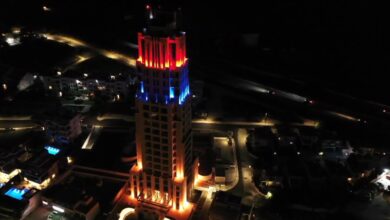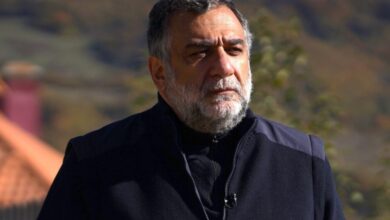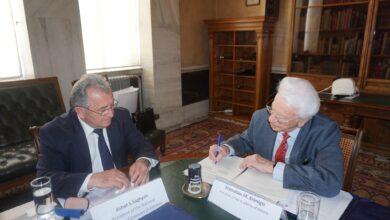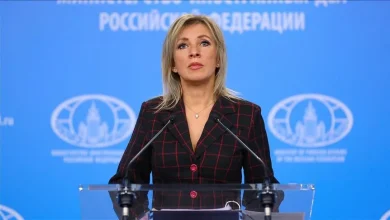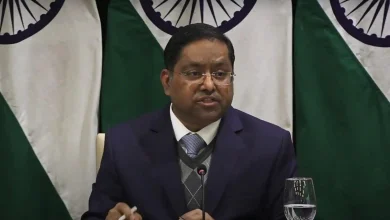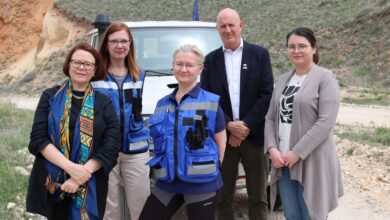
At a joint press conference of the Eastern Partnership and Visegrad Four Foreign Ministers in Prague the correspondent of the “Orer” Czech-Armenian magazine raised the issue of recent tension at the Nagorno Karabakh line of contact, the beheading of NKR Defense Army soldiers, and the subsequent awarding of the highest honour to the war criminal. The journalist asked the Foreign Ministers why they failed to give a political evaluation to this DAESH-ISIS-style behaviour of both the soldier, and the president, and the country itself.
Azerbaijani Foreign Minister Elmar Mammadyarov preferred to avoid answering the question and speak about the situation at the line of contact instead, accusing the Armenian side of provocations.
In response to that Armenian Foreign Minister Edward Nalbandian stated: “A very long lecture, but no answer to a very direct and very clear question. Because I agree that enough is enough, to proclaim murderers as national heroes of Azerbaijan. It was done with Ramil Safarov and now, you know all the brutalities during a very large scale, very well planned and prepared aggressive military operations against Nagorno-Karabakh and during those operations, DAESH-style brutalities, maybe not DAESH-style, but Baku-style, because before it was the case of Ramil Safarov. Three captured Armenian soldiers were beheaded, and their heads were demonstrated in the villages and cities of Azerbaijan. And one of the murderers was proclaimed just two days ago by the Azerbaijani President as a national hero.
I will not go to the deep of the history of this conflict, but it is well-known that the conflict was created by the aggression of Azerbaijan against Nagorno-Karabakh with the use of mercenaries, closely linked to notorious terrorist organizations. The Azerbaijani Foreign Minister recalled the four resolutions of the United Nations Security Council. Why four? Because after the adoption of each resolution, Azerbaijan rejected to respect them. And four resolutions were adopted with one goal – to stop hostilities. Azerbaijan did not respect it. Till now, after the ceasefire agreement was reached in 1994 on trilateral basis, signed by Azerbaijan, Nagorno-Karabakh and Armenia, and they have no time limitations, the three Co-Chair countries, by the way, these are very well known facts for everybody, permanent members of the Security Council, never made any reference to those resolutions of the SC. Because the SC resolutions were adopted, as I said, to have a cease-fire. And the cease-fire was adopted later on, in 1994, May, by the abovementioned trilateral agreement, then confirmed in July 1994, and then in February 1995.
By the way, during this operation, the last operation, the Azerbaijani diplomats were trying to present the situation as if those agreements are not in force. A Note Verbale was sent to Vienna, to the Secretariat of the OSCE saying those agreements are not in force. My colleague told the three Co-Chairs that the Ambassador of Azerbaijan had no instruction to do that, it was unilateral, a personal initiative. And the three Co-Chairs, because Note Verbale was not withdrawn, were obliged to send their own Verbal Note saying, no, the three agreements of 1994, 1995 have no time limitations, and they have to be respected and fully implemented, and the oral arrangement reached on April 5th, 2016, in Moscow pursued the goal of stopping hostilities, to restore the ceasefire agreements of 1994, 1995.
Later on, another Azerbaijani diplomat distributed another Note Verbale in New York, in the UN. Again my colleague told the three Co-Chairs that it was without his instructions, the diplomat had just initiated it on a personal basis and distributed this letter. But because this Note Verbale was not withdrawn, so the three Co-Chair countries, just to remind they are the three permanent members of the UN security Council – Russia, United States and France – they were obliged to distribute last Saturday a letter saying that the trilateral ceasefire agreements reached in 1994, 1995 have to be fully respected.
What do we have today? Very negative consequences of this aggression against Nagorno-Karabakh, the aggression at the beginning of April. And we have to continue our efforts together with the three Co-Chairs to restore a negotiating environment and to assure, guarantee no repetition of such kind of things, which happened in the beginning of April, and first of all to implement the proposal of the Co-Chairs to create the mechanism of investigation of the violation of the ceasefire, rejected by Azerbaijan, accepted by Armenia and Nagorno-Karabakh. And another proposal – to increase, to enhance, to make stronger the capacities of the office and the team of the Personal Representative of the OSCE Chairperson-in-Office on the ground, but not to reduce the capacities of this team, that Azerbaijan is trying to do.
That is what we have, and Armenia will continue its efforts together with the three Co-Chair countries to find an exclusively peaceful, negotiated solution for this conflict.”


